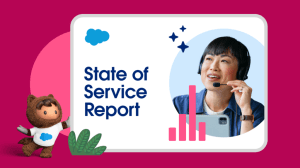4 in 5 APAC Developers View AI Agents as Essential to App Development as Traditional Software Tools: Salesforce Research

New State of IT research reveals software development leaders are bullish on agentic AI and it’s impact
Over half (51%) feel they aren’t fully equipped with the right skills for the agentic era
SINGAPORE – March 2025 – Salesforce (NYSE: CRM), the global leader in CRM, today announced its latest State of IT survey, sharing insights from more than 2,000 software development leaders, including 587 from the Asia Pacific (APAC) region. The survey of software development leaders reveals that more than four in five believe AI agents will become as essential to app development as traditional software tools.
Developers have often been painted as wary of AI, but new research reveals developers are enthusiastic about the industry’s shift to AI agents. In APAC, 70% of developers believe AI agents would accelerate application development, driving greater efficiency and productivity.
Low-code/no-code tools help developers unlock greater productivity, regardless of coding skills
With agents powered by low-code/no-code tools, developers of all levels can now build and deploy agents. Respondents believe these tools will help democratize and scale AI development for the better.
- 86% of developers in APAC using agentic AI currently use low-code/no-code tools.
- 79% of developers in APAC say that low-code/no-code tools can help democratize AI development.
- 85% of developers in APAC say that the use of low-code/no-code app development tools can help scale AI development.
Developers are eager for more resources to build AI agents
Developers say updated infrastructure and more testing capabilities and skilling opportunities are critical as they transition to building and deploying AI agents.
- Infrastructure Needs: Many developers in APAC (85%) believe their organization needs to update their infrastructure to build/deploy AI agents.
- Nearly half (46%) of developers in APAC say their data quality and accuracy isn’t sufficient for the successful development and implementation of agentic AI.
- Testing Capabilities: Nearly half (45%) of developers in APAC say their testing processes aren’t fully prepared to build and deploy AI agents.
- Skills and Knowledge: More than 8 in 10 developers in APAC believe AI knowledge will soon be a baseline skill for their profession, but over half (51%) don’t feel their skillsets are fully prepared for the agentic era.
- Survey respondents identified training on technical AI skills and redefining current roles as the most important areas for employers to provide support.
“AI agents are redefining software development. Low-code/no-code tools allow developers of all skill levels to build and deploy agents, lowering barriers to entry and scaling AI development for the better. What’s more, AI agents also enable developers to shift their focus from manual coding and repetitive tasks to high-value problem-solving, architecture and strategic decision-making. This transition from output to business impact is being powered by solutions like Agentforce that make writing, reviewing and optimising code faster, easier and more efficient than ever before. The impact of AI agents on the industry is undeniable, and the best time for organisations to invest in empowering developers with the right skills, resources and infrastructure is right now,” said Gavin Barfield, Vice President & Chief Technology Officer, Solutions, ASEAN, Salesforce.
###
Methodology
The data is sourced from a software development leader segment of a double-anonymous survey of IT decision-makers conducted from December 24, 2024 through February 3, 2025. The Asia Pacific respondents represent Australia, India, Indonesia, Japan, New Zealand, Singapore, South Korea and Thailand.









